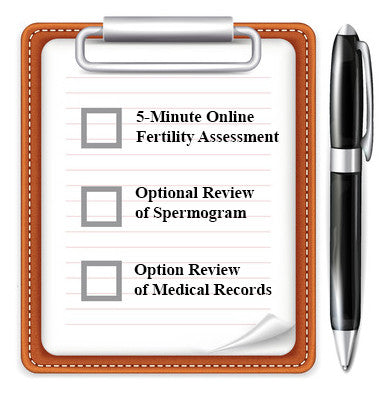
Major Causes of Male Infertility
Causes of Infertility in Men and Women
There are a number of possible reasons for involuntary childlessness, which makes it all-the-more important to control what you can and take a scientific and methodical approach to help with successful conception.
Take the Supplemena Fertility Assessment
We encourage all of our customers to take our no-obligation/ free-of-charge online fertility evaluation, by clicking the image below, where one of our fertility specialists will analyse your particular case, and make recommendations, specific to your situation.
It is equally important to be familiar with many of the common causes of infertility, a number of which we analyse below.
Sub-Optimal Sperm Health
Fertilmas is comprised of targetted combination of vitamins, minerals and amin acids to help with the most common forms of poor sperm health. With its highly concentrated, balanced combination of particular nutrients Fertilmas can contribute to improving male sperm quality in cases of:
Most Common Causes of Infertility
-
Oligospermia/ Oligozoospermia - Refers to semen with a low concentration of sperm and is a common finding in male infertility.
-
Asthenospermia/ Asthenozoospermia - Is the medical term for reduced sperm motility and the most common form of infertility in men.
-
Teratospermia/ Teratozoospermia - Is a condition characterised by the presence of sperm with abnormal morphology that affects fertility in males.

Teratospermia/ Teratozoospermia might perhaps be the more complicated form of poor sperm health, and within Teratospermia itself, there are a number of defects, on the sperm's head, neck and mid-range, that might be present.
Sub Optimal Morphology - Teratospermia

It is vitally important that any couples suffering from involuntary childlessness, seek sperm clinical analysis 9spermogram) to confirm, that either of the three conditions above are not present and the cause for unsuccessful conception.
Lifestyle & Behavioural Factors
- Stress
- Medication
- Poor or inadequate nutrition
- Alcohol consumption
- Smoking
Environmental Factors
- Environmental pollutants
- Toxins
- Excess Heat
Physiological Causes
Fertility disorders in both men & women may also be partly attributed to our own physiology. Below we explore some of the medical conditions which may also make successful conception more difficult to achieve.
Organic causes of fertility disorders in men:
- Age
- Undescended testes
- Varicose veins in the testicles
- Impaired testicle function, post-infection
- Changes to hereditary factors
- Hormonal disorders
Organic causes of fertility disorders in women:
- Age
- Hormonal disorders
- Inflammations of the genital organs
- Obstruction of the fallopian tubes
- Changes to the inner lining of the uterus
- Changes to hereditary factors
- Severe excess weight or weight deficiency
We encourage all of our customers to take our no-obligation/ free-of-charge online fertility evaluation, where one of our fertility specialists will analyse your particular case, and make recommendations, specific to your situation.
Research
Between 30 percent to 80 percent of male subfertility cases are considered to be due to the damaging effects of oxidative stress on sperm. Oral supplementation with antioxidants may improve sperm quality by reducing oxidative stress. (The Cochrane Collaboration, 2012 John Wiley & Sons Ltd.)







